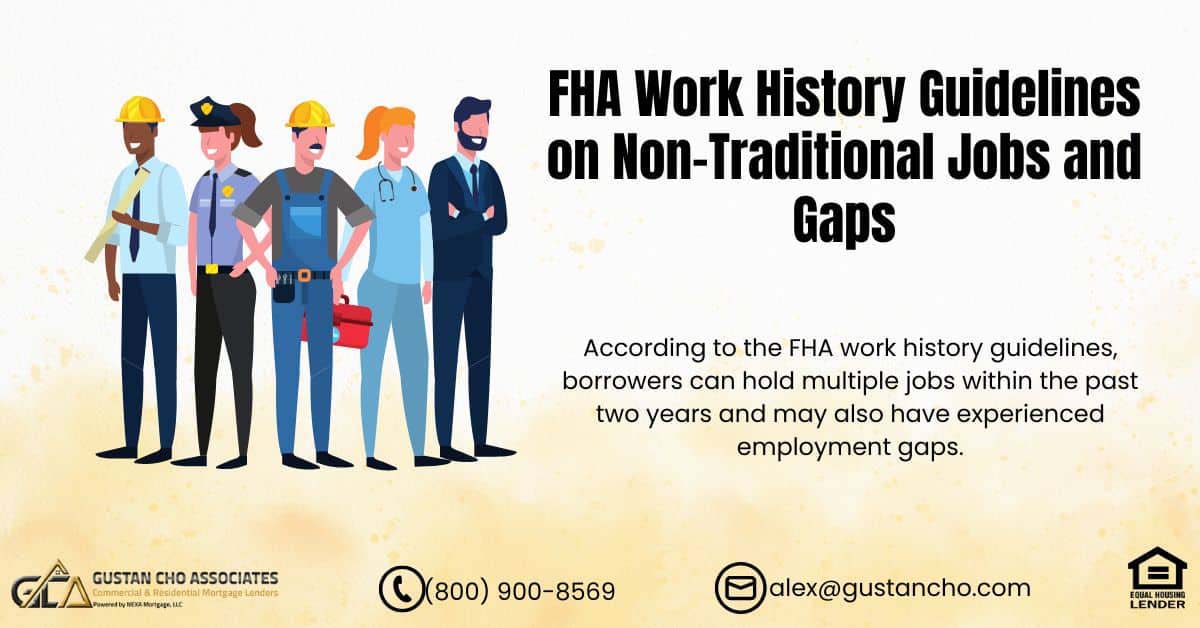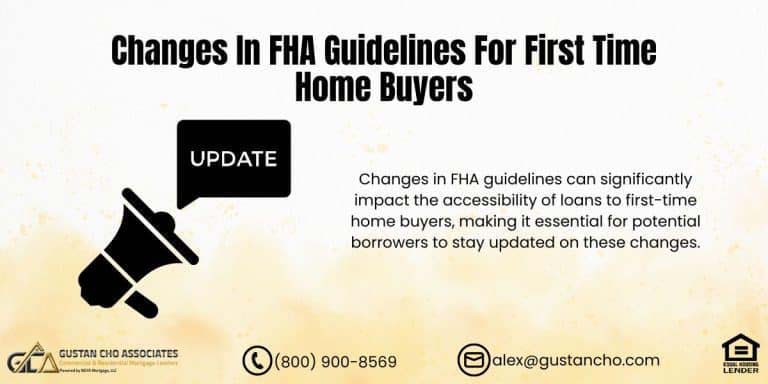FHA Work History Guidelines: Can You Qualify with Gaps in Employment?
If you’ve been dreaming of owning a home but worry about your work history, you’re not alone. Many borrowers are in the same boat, wondering if gaps in employment or multiple jobs could hurt their chances of getting approved for a mortgage. The good news? The FHA work history guidelines for 2024 have borrower-friendly rules that might work in your favor.
This guide will explain FHA work history guidelines to help you understand how to qualify for a home loan, even if your job history isn’t perfect.
Talk to a Loan Officer About FHA Work History Guidelines
Why FHA Loans are a Great Option
FHA loans receive insurance from the Federal Housing Administration (FHA). This government entity aims to expand access to homeownership for a broader population. One reason FHA loans are so popular is that they have flexible requirements, especially regarding work history, credit scores, and down payments.
- Low down payment: As little as 3.5% down, even with lower credit scores.
- Flexible employment guidelines: Borrowers with gaps in employment can still qualify.
- Lower credit score thresholds: You can qualify with a credit score as low as 500 with a higher down payment.
Now, let’s dive into the 2024 FHA work history guidelines, so you know what to expect.
What Are FHA Work History Guidelines?
The FHA requires homebuyers to show a two-year work history, but there’s a lot of flexibility in applying this rule. You don’t need to have worked the same job or even had consistent employment for two years. The primary objective of the FHA is to ensure that you have a steady and dependable income to meet your mortgage payments.
Here’s the bottom line:
- You don’t have to have a steady, uninterrupted two-year work history.
- You can have multiple jobs during that time.
- Even employment gaps are allowed under certain conditions.
Let’s take a closer look at the FHA work history guidelines and how they might apply to your situation.
Qualify for an FHA Loan with Multiple Jobs Today
FHA Guidelines on Gaps in Employment
You might think, “I’ve had some gaps in my employment history—will that hurt my chances?” Not necessarily. The FHA allows gaps in your work history as long as you’ve been employed for a total of two years within the last five years. This is great news if you’ve taken time off for any number of reasons—whether it was to search for a new job, take care of family, or go back to school.
Example of FHA Employment Gap Guidelines:
Let’s say you worked at Company A from 2018 to 2019, took two years off, and then got a job at Company B in 2022. As long as you have a total of two years of work history within the past five years, you could qualify for an FHA loan.
What If the Gap is Longer Than Six Months?
If your gap in employment is longer than six months, the FHA will still work with you. However, you’ll need to meet a few extra guidelines:
- Be back to work for at least six months.
- Provide evidence of your present employment by submitting pay stubs displaying a minimum of 30 days’ income.
Multiple Jobs and Inconsistent Employment: Still Eligible!
Not everyone has had the same job for years, and that’s okay. The FHA understands that some borrowers switch jobs frequently or work multiple jobs. This won’t disqualify you as long as you meet the general two-year work history requirement.
Can You Qualify with Multiple Jobs?
Absolutely! You can qualify for an FHA loan with multiple jobs as long as your work history totals two years. Here’s how it works:
- You could have worked for three different companies over two years.
- You could have juggled two part-time jobs during that time.
The FHA wants to see that your income is steady enough to afford your mortgage payments, even if you’ve had multiple jobs.
Click here to apply for an FHA Loan
What About Self-Employment or 1099 Income?
Self-employed borrowers or 1099 earners often wonder if they’ll have a harder time qualifying for an FHA loan. While the guidelines are a bit stricter, it’s still possible.
What You’ll Need:
- Two consecutive years of tax returns demonstrating steady earnings.
- If you’ve been self-employed for less than two years, qualifying may be harder. Still, exceptions can be made if your income is stable and reliable.
FHA Guidelines for Part-Time, Overtime, and Bonus Income
Good news: Part-time, overtime, and bonus income can count toward your qualification, but there are rules:
- You need to show a two-year history of this income.
- The income must be consistent from the same employer or industry.
This is great for those who supplement their full-time income with part-time gigs or earn frequent bonuses.
Can You Qualify If You’ve Recently Changed Careers?
Perhaps you have recently switched careers and are concerned that this change could negatively impact your ability to be approved for a mortgage. The FHA work history guidelines allow career changes as long as the new job offers better opportunities or higher income.
For example, if you’ve transitioned from an entry-level job to a more skilled profession that offers better pay, the FHA will likely view this as a positive.
How to Prove Career Advancement:
- Show documentation of the new job, like an offer letter or employment contract.
- Provide pay stubs or other evidence that your income is now higher.
FHA Lenders With No Overlays
It’s important to note that while FHA guidelines are generally lenient, some lenders impose additional requirements known as overlays. For instance, a lender might require two years of steady employment with the same employer or a higher credit score than FHA guidelines specify.
To improve your chances of approval, seek out lenders with no overlays, like Gustan Cho Associates, who follow only the FHA’s minimum guidelines. These lenders don’t add extra requirements, making qualifying easier for borrowers with job changes, employment gaps, or lower credit scores.
Debt-to-Income (DTI) Ratio Requirements for FHA Loans
One of the most important factors in your mortgage application is your debt-to-income ratio (DTI). The Federal Housing Administration permits higher DTIs than numerous traditional loans, which simplifies the qualification process for individuals with current debt.
Here are the 2024 guidelines:
- Front-end DTI (housing costs only): up to 46.9%.
- Back-end DTI (total debts): up to 56.9%.
If you have compensating factors—like a larger down payment, strong credit, or significant savings—the FHA may allow higher DTI ratios. This makes FHA loans one of the most flexible options for borrowers who have debt but still want to buy a home.
How to Improve Your Chances of Approval
Even if your work history isn’t perfect, there are ways to increase your chances of being approved for an FHA loan. Here are a few tips:
- Gather Documentation: Ensure you have all the paperwork showing your work history and income. This includes pay stubs, tax returns, and other financial documents proving you’ve had steady income over the past two years.
- Work with an Experienced Loan Officer: Not all lenders follow the same guidelines; some may be stricter than others. Working with a loan officer who understands FHA guidelines and can help you navigate the process is essential.
- Check Your Credit: The minimum credit score requirements should still be met, even though FHA work history guidelines are more lenient with credit scores. It’s crucial to ensure that your credit report is accurate. For most FHA loans, you’ll need a credit score of at least 580 to qualify with a 3.5% down payment. If your score is between 500-579, you’ll need a 10% down payment.
- Consider Compensating Factors: If your DTI ratio is high or your employment history is shaky, compensating factors like a larger down payment, savings, or a strong credit score can improve your chances of approval.
FHA Work History Guidelines for 2024: Making Homeownership Possible
The FHA work history guidelines make it easier for borrowers with gaps in employment, multiple jobs, or inconsistent work history to qualify for a mortgage. With flexible rules and higher DTI limits, the FHA is committed to helping more people achieve the dream of homeownership in 2024.
If you’re ready to take the next step toward buying or refinancing a home, contact an FHA-approved lender with no overlays. They can help guide you through the process and ensure you’re on the right path to homeownership, regardless of your work history.
Contact Gustan Cho Associates today at 800-900-8569 or alex@gustancho.com to see if you qualify for an FHA loan and start the process of owning your dream home.
Pre-Qualify for an FHA Loan in 3 Minutes
Frequently Asked Questions About FHA Work History Guidelines:
Q: What are FHA work history guidelines?
A: FHA work history guidelines require homebuyers to show two years of work history, but they offer flexibility. You don’t need a steady job with the same employer for two years—gaps and multiple jobs are allowed as long as you’ve worked for two years in the last five years.
Q: Can I get an FHA loan if I have gaps in my work history?
A: Yes! Under FHA work history guidelines, you can qualify for a loan with gaps in your employment. You can still get approved if you’ve been employed for two years in total within the past five years.
Q: Can I get an FHA loan if I have multiple jobs?
A: Absolutely. The FHA work history guidelines allow you to qualify with multiple jobs as long as you meet the two-year work history requirement. It’s about consistent income, even if you’ve changed jobs.
Q: Do I need to be employed at the same job for two years to qualify for an FHA loan?
A: No, you don’t need to be employed with the same company for two years. The FHA work history guidelines only require a total of two years of employment, even if it’s with different employers.
Q: Can self-employed people qualify for an FHA loan?
A: Yes, self-employed borrowers can qualify, but FHA work history guidelines require two years of tax returns to show consistent income from self-employment or 1099 income.
Q: How do I qualify for an FHA loan after a long employment gap?
A: If you’ve been out of work for six months or more, FHA work history guidelines require that you return to work for at least six months and provide 30 days of pay stubs to qualify for a loan.
Q: Does part-time income count toward an FHA loan?
A: Yes, part-time income can count toward your loan qualification under FHA work history guidelines, but you’ll need to show a two-year history of consistent part-time income from the same employer or industry.
Q: Is it possible for me to be eligible for an FHA loan if I have recently switched careers?
A: Yes, as long as your new job offers better pay or opportunities, FHA work history guidelines will consider this a positive factor for your loan application.
Q: What is a debt-to-income (DTI) ratio, and how does it affect my FHA loan application?
A: Your DTI ratio represents your debt relative to your income. The FHA permits higher DTI ratios, reaching up to 56.9%, simplifying the loan qualification process, even if you currently have outstanding debts.
Q: What if a lender tells me I don’t qualify because of job gaps?
A: If a lender tells you that you don’t qualify due to employment gaps, they might have lender overlays. Look for a lender with no overlays who follow the FHA work history guidelines, like Gustan Cho Associates.
Related> Gaps in employment to qualify for a mortgage
Related> What if I do not have two-year employment history?
Related> How do mortgage lenders view income and employment?
This blog about “FHA Work History Guidelines on Non-Traditional Jobs and Gaps” was updated on September 24th, 2024.










